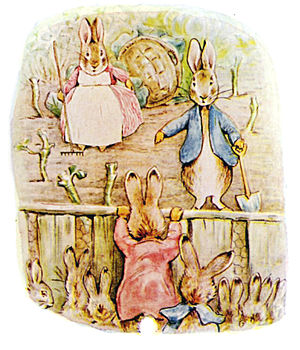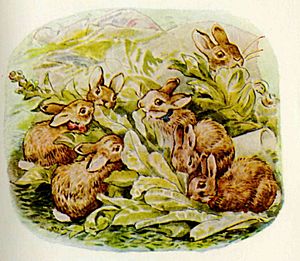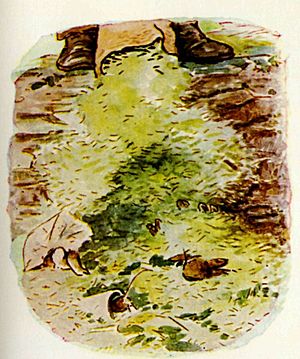The Tale of The Flopsy Bunnies
The Tale of
The
Flopsy Bunnies

BEATRIX POTTER
THE ORIGINAL AND AUTHORIZED EDITION
New color reproductions
THE TALE
OF
THE FLOPSY BUNNIES
THE TALE OF
THE FLOPSY BUNNIES
BY
BEATRIX POTTER
Author of
"The Tale of Peter Rabbit," &c.

FREDERICK WARNE
The reproductions in this book have been made using the most modern electronic scanning methods from entirely new transparencies of Beatrix Potter's original watercolours. They enable Beatrix Potter's skill as an artist to be appreciated as never before, not even during her own lifetime.
FREDERICK WARNE
Published by the Penguin Group
27 Wrights Lane, London W8 5TZ, England
Penguin Books USA Inc., 375 Hudson Street, New York, New York 10014, USA
Penguin Books Australia Ltd, Ringwood, Victoria, Australia
Penguin Books Canada Ltd, 10 Alcorn Avenue, Toronto, Ontario, Canada N4V 3B2
Penguin Books (NZ) Ltd, 182-190 Wairau Road, Auckland 10, New Zealand
Penguin Books Ltd, Registered Offices: Harmondsworth, Middlesex, England
First published 1909
Published with new reproductions 1987
This edition first published in paperback 1991
This hardcover edition first published 1992
Universal Copyright Notice:
Text and original illustrations copyright © Frederick Warne & Co, 1909
Copyright in all countries signatory to the Berne Convention
New reproductions copyright © Frederick Warne & Co., 1987
This paperback edition copyright © Frederick Warne & Co., 1991
Copyright in all countries signatory to the Berne and Universal Conventions
All rights reserved. Without limiting the rights under copyright reserved above, no part of this publication may be reproduced, stored in or introduced into a retrieval system, or transmitted, in any form or by any means (electronic, mechanical, photocopying, recording or otherwise), without the prior written permission of both the copyright owner and the above publisher of this book.
Printed and bound in Great Britain by
William Clowes Limited, Beccles and London
FOR ALL LITTLE FRIENDS
OF
MR. McGREGOR & PETER & BENJAMIN

IT is said that the effect of eating too much lettuce is "soporific."
I have never felt sleepy after eating lettuces; but then I am not a rabbit.
They certainly had a very soporific effect upon the Flopsy Bunnies!
WHEN Benjamin Bunny grew up, he married his Cousin Flopsy. They had a large family, and they were very improvident and cheerful.
I do not remember the separate names of their children; they were generally called the "Flopsy Bunnies."


AS there was not always quite enough to eat,—Benjamin used to borrow cabbages from Flopsy's brother, Peter Rabbit, who kept a nursery garden.
SOMETIMES Peter Rabbit had no cabbages to spare.


WHEN this happened, the Flopsy Bunnies went across the field to a rubbish heap, in the ditch outside Mr. McGregor's garden.
MR. McGREGOR'S rubbish heap was a mixture. There were jam pots and paper bags, and mountains of chopped grass from the mowing machine (which always tasted oily), and some rotten vegetable marrows and an old boat or two. One day—oh joy!—there were a quantity of overgrown lettuces, which had "shot" into flower.


THE Flopsy Bunnies simply stuffed lettuces. By degrees, one after another, they were overcome with slumber, and lay down in the mown grass.
Benjamin was not so much overcome as his children. Before going to sleep he was sufficiently wide awake to put a paper bag over his head to keep off the flies.
THE little Flopsy Bunnies slept delightfully in the warm sun. From the lawn beyond the garden came the distant clacketty sound of the mowing machine. The blue-bottles buzzed about the wall, and a little old mouse picked over the rubbish among the jam pots.
(I can tell you her name, she was called Thomasina Tittlemouse, a woodmouse with a long tail.)


SHE rustled across the paper bag, and awakened Benjamin Bunny.
The mouse apologized profusely, and said that she knew Peter Rabbit.
WHILE she and Benjamin were talking, close under the wall, they heard a heavy tread above their heads; and suddenly Mr. McGregor emptied out a sackful of lawn mowings right upon the top of the sleeping Flopsy Bunnies! Benjamin shrank down under his paper bag. The mouse hid in a jam pot.


THE little rabbits smiled sweetly in their sleep under the shower of grass; they did not awake because the lettuces had been so soporific.
They dreamt that their mother Flopsy was tucking them up in a hay bed.
Mr. McGrcgor looked down after emptying his sack. He saw some funny little brown tips of ears sticking up through the lawn mowings. He stared at them for some time.
PRESENTLY a fly settled on one of them and it moved.
Mr. McGregor climbed down on to the rubbish heap—
"One, two, three, four! five! six leetle rabbits!" said he as he dropped them into his sack. The Flopsy Bunnies dreamt that their mother was turning them over in bed. They stirred a little in their sleep, but still they did not wake up.


MR. McGREGOR tied up the sack and left it on the wall.
He went to put away the mowing machine.
WHILE he was gone, Mrs. Flopsy Bunny (who had remained at home) came across the field.
She looked suspiciously at the sack and wondered where everybody was?


THEN the mouse came out of her jam pot, and Benjamin took the paper bag off his head, and they told the doleful tale.
Benjamin and Flopsy were in despair, they could not undo the string.
But Mrs. Tittlemouse was a resourceful person. She nibbled a hole in the bottom corner of the sack.
THE little rabbits were pulled out and pinched to wake them.
Their parents stuffed the empty sack with three rotten vegetable marrows, an old blacking-brush and two decayed turnips.


THEN they all hid under a bush and watched for Mr. McGregor.
MR. McGREGOR came back and picked up the sack, and carried it off.
He carried it hanging down, as if it were rather heavy.
The Flopsy Bunnies followed at a safe distance.


THEY watched him go into his house.
And then they crept up to the window to listen.
MR. McGREGOR threw down the sack on the stone floor in a way that would have been extremely painful to the Flopsy Bunnies, if they had happened to have been inside it.
They could hear him drag his chair on the flags, and chuckle—
"One, two, three, four, five, six leetle rabbits!" said Mr. McGregor.


"EH? What's that? What have they been spoiling now?" enquired Mrs. McGregor.
"One, two, three, four, five, six leetle fat rabbits!" repeated Mr. McGregor, counting on his fingers—"one, two, three—"
"Don't you be silly; what do you mean, you silly old man?"
"In the sack! one, two, three, four, five, six!" replied Mr. McGregor.
(The youngest Flopsy Bunny got upon the window-sill.)
MRS. McGREGOR took hold of the sack and felt it. She said she could feel six, but they must be old rabbits, because they were so hard and all different shapes.
"Not fit to eat; but the skins will do fine to line my old cloak."
"Line your old cloak?" shouted Mr. McGregor—"I shall sell them and buy myself baccy!"
"Rabbit tobacco! I shall skin them and cut off their heads."


MRS. McGREGOR untied the sack and put her hand inside.
When she felt the vegetables she became very very angry. She said that Mr. McGregor had "done it a purpose."
AND Mr. McGregor was very angry too. One of the rotten marrows came flying through the kitchen window, and hit the youngest Flopsy Bunny.
It was rather hurt.

THEN Benjamin and Flopsy thought that it was time to go home.


SO Mr. McGregor did not get his tobacco, and Mrs. McGregor did not get her rabbit skins.
But next Christmas Thomasina Tittlemouse got a present of enough rabbit-wool to make herself a cloak and a hood, and a handsome muff and a pair of warm mittens.
The Original
Peter Rabbit Books
BY
BEATRIX POTTER
- The Tale of Peter Rabbit
- The Tale of Squirrel Nutkin
- The Tailor of Gloucester
- The Tale of Benjamin Bunny
- The Tale of Two Bad Mice
- The Tale of Mrs. Tiggy-Winkle
- The Tale of Mr. Jeremy Fisher
- The Tale of Tom Kitten
- The Tale of Jemima Puddle-Duck
- The Tale of the Flopsy Bunnies
- The Tale of Mrs. Tittlemouse
- The Tale of Timmy Tiptoes
- The Tale of Johnny Town-Mouse
- The Tale of Mr. Tod
- The Tale of Pigling Bland
- The Tale of Samuel Whiskers
or The Roly-Poly Pudding - The Tale of The Pie and The Patty-Pan
- The Tale of Ginger and Pickles
- The Tale of Little Pig Robinson
- The Story of A Fierce Bad Rabbit
- The Story of Miss Moppet
- Appley Dapply's Nursery Rhymes
- Cecily Parsley's Nursery Rhymes
![]()
This work is in the public domain in the United States because it was published in 1909, before the cutoff of January 1, 1929.
The longest-living author of this work died in 1943, so this work is in the public domain in countries and areas where the copyright term is the author's life plus 80 years or less. This work may be in the public domain in countries and areas with longer native copyright terms that apply the rule of the shorter term to foreign works.
![]()
Public domainPublic domainfalsefalse

